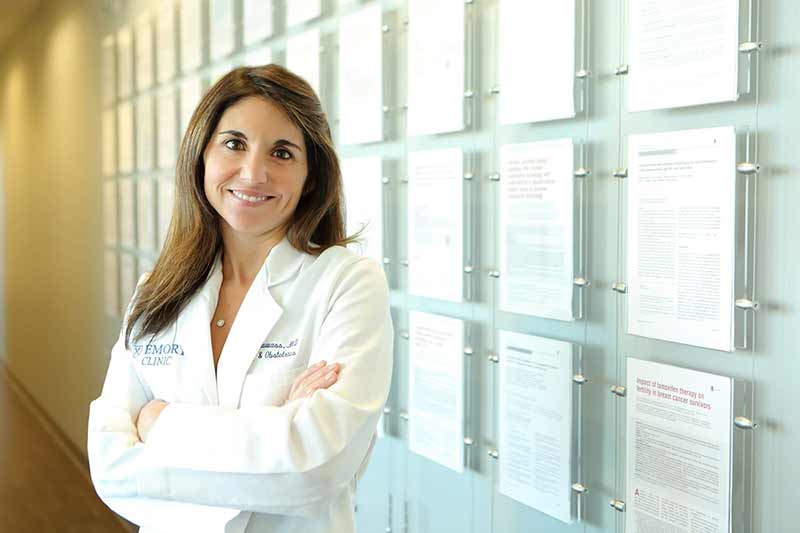Cancer and Fertility: Emory Reproductive Endocrinologists Guide Patients Along Their Journey

A cancer diagnosis can be overwhelming and scary. Individuals face questions and decisions they often have to answer quickly. For women and men of childbearing age, those questions should include fertility preservation.
“Women of reproductive age with a new cancer diagnosis benefit from discussing their future fertility with a reproductive endocrinologist,” says Jennifer Kawwass, MD and medical director, Emory Reproductive Center. “Learning about the potential impact of cancer treatment on ovarian reserve and about existing fertility preservation options is important. Whether or not they choose to freeze sperm, eggs, or embryos, we aim to help patients make informed decisions before their treatment begins.”
Empower with Education
The team at Emory Reproductive Center is committed to working closely with patients and oncologists, helping everyone understand their options when it comes to fertility preservation and the ability to have children after treatment.
“We must do a better job talking with men and women of reproductive age who have just been told they have cancer,” Laurie McKenzie, MD, reproductive endocrinologist at Emory Reproductive Center says. “This is important to patients. We must give them the resources they need and offer the option to talk with a reproductive endocrinologist.”
Often, fertility preservation must be pursued quickly after the initial cancer diagnosis. The entire Emory Reproductive Center team - Dr. Jennifer Kawwass, Dr. Laurie McKenzie, Dr. Heather Hipp and Dr. Austin Schirmer under the leadership of Dr. Jessica Spencer, Division Director, Emory Reproductive Center - work to see patients quickly, often within 72 hours if possible.
“If patients want to learn more about fertility preservation, we do everything we can to see that individual as quickly as possible,” states Dr. Kawwass. “Whether or not they ultimately decide to pursue fertility treatments is up to them. It’s our goal to educate and empower individuals so they can make an informed decision.”
The first appointment at the Center is simply a conversation. The providers, nurses and staff are available to answer questions, discuss any possible impact treatments may have on fertility and discuss options.
Dr. Kawwass works closely with her colleagues, making sure every patient’s needs are understood and met. Every physician in the practice is a faculty member at Emory University School of Medicine and brings the latest advancements and thinking to each individual’s care. The team manages a range of conditions that impact reproductive health, including male and female factor infertility, recurrent pregnancy loss, uterine anomalies, unexplained infertility and much more.
Advances in Fertility Preservation
Cancer patients and their families have more options for preserving fertility today than ever before.

Jennifer Kawwass, MD stands in front of faculty research that fills the wall of the clinic hallway.
“New ideas, developments and innovations are what makes fertility preservation so exciting,” Dr. McKenzie says. “What I’m doing today clinically is different from 5 years ago, from 16 years ago. That’s what is unique about reproductive endocrinology.”
Oocyte vitrification, which flash freezes a woman’s egg, is the most recent exciting breakthrough. Vitrification offers better outcomes and reduces the risk of damage to the egg, compared to previous slow freezing methods.
“An egg is a very unique cell because of its large surface area,” says Dr. McKenzie. “Slow-freezing methods can create intracellular ice crystals and damage the egg – which can make it not viable. Now, vitrification offers a 90-95 percent survival rate for eggs.”
“Oocyte cryopreservation gives women so many more options,” she explains. “A woman in her twenties or thirties who has been diagnosed with cancer has more reproductive choices than she had in the past.
“This is a huge advancement for fertility preservation, and not just for cancer patients,” Dr. McKenzie continues. “Vitrification gives us the ability to better address age-related fertility decline. Women are starting families later in life. An egg frozen at 35 is more viable than a fresh egg at 42. That’s exciting news for many women.”
Another exciting advancement in fertility preservation is the ability to start fertility treatments independently of a woman’s menstrual cycle.
“It used to be that you had to time egg stimulation and retrieval to a woman’s menstrual cycle,” explains Dr. Kawwass. “Now, we’re able to quick start stimulation, regardless of where a woman may be in her cycle. This is really important, and beneficial for women who need to start chemotherapy quickly and can’t wait to time treatments to her cycle.”
Proven Impact
“I truly believe that I have the best job,” says Dr. Kawwass. “We have the opportunity to spend quality time with our patients and give them something that has such a lasting impact.”
Dr. Kawwass credits the Center’s success rate to the entire team’s dedication to their patients, as well as, their passion for research, evidence-based practices, and quality care.
“Our physicians are compassionate and detailed orientated,” she says. “We consider each patient as an individual and optimize their treatment plan. This approach is what has helped our clinic see results that are above the national average for successful fertility treatments.”
The entire team also looks forward to continued advancements in fertility preservation and reproductive medicine.
“Currently, we are looking at the long-term reproductive outcomes of cancer survivors,” Dr. McKenzie says. “The S.A.F.E registry (Survivors And Fertility) we have established includes men and women that have undergone cancer treatment. We want to know how treatments affect reproductive health, outcomes of egg freezing and evaluate when and why they made decisions about fertility preservation.
“This prospective type of research will help us better understand what’s important to our patients, and also be able to identify any long-term trends and impact that we just aren’t able to see now,” she continues.
Another exciting research area involves studying the cells that support the growth and development of human eggs.
“At Emory, we are just beginning to look at how the changes in these supporting (granulosa) cells can give us information about the egg and its fertility potential,” Dr. McKenzie shares. “This could potentially lead to even better outcomes for our patients.”
The partnership between Emory’s Reproductive Center and the Winship Cancer Institute helps power and support these types of studies that offer hope and advancements for the future. Faculty is placed within the Emory School of Medicine so that research advancements and treatment innovations are built into the work being done from a clinical perspective.
Learn More
To learn more about Emory Reproductive Center and the Oncofertility Program on their website or call 404- 778-3401.




